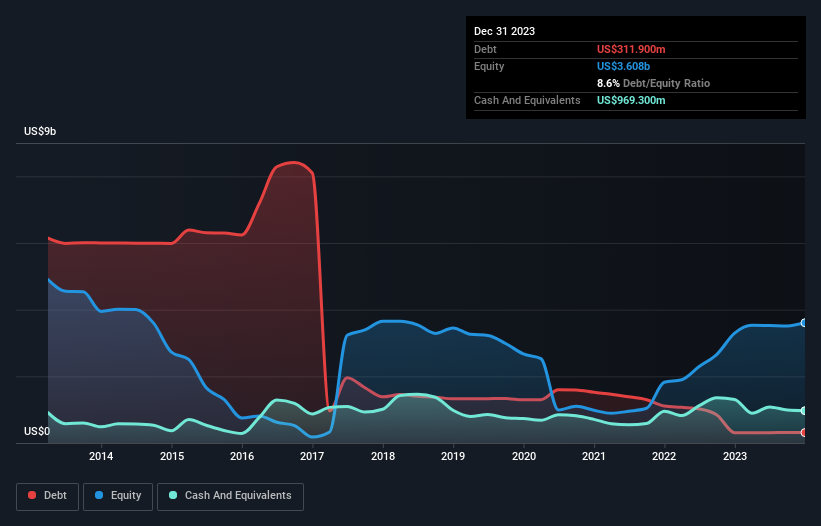- United States
- /
- Oil and Gas
- /
- NYSE:BTU
These 4 Measures Indicate That Peabody Energy (NYSE:BTU) Is Using Debt Reasonably Well

Howard Marks put it nicely when he said that, rather than worrying about share price volatility, 'The possibility of permanent loss is the risk I worry about... and every practical investor I know worries about.' It's only natural to consider a company's balance sheet when you examine how risky it is, since debt is often involved when a business collapses. We can see that Peabody Energy Corporation (NYSE:BTU) does use debt in its business. But should shareholders be worried about its use of debt?
What Risk Does Debt Bring?
Debt assists a business until the business has trouble paying it off, either with new capital or with free cash flow. Part and parcel of capitalism is the process of 'creative destruction' where failed businesses are mercilessly liquidated by their bankers. While that is not too common, we often do see indebted companies permanently diluting shareholders because lenders force them to raise capital at a distressed price. Of course, plenty of companies use debt to fund growth, without any negative consequences. The first step when considering a company's debt levels is to consider its cash and debt together.
Check out our latest analysis for Peabody Energy
What Is Peabody Energy's Debt?
The chart below, which you can click on for greater detail, shows that Peabody Energy had US$311.9m in debt in December 2023; about the same as the year before. But on the other hand it also has US$969.3m in cash, leading to a US$657.4m net cash position.

A Look At Peabody Energy's Liabilities
According to the last reported balance sheet, Peabody Energy had liabilities of US$979.0m due within 12 months, and liabilities of US$1.38b due beyond 12 months. On the other hand, it had cash of US$969.3m and US$389.7m worth of receivables due within a year. So it has liabilities totalling US$995.6m more than its cash and near-term receivables, combined.
Peabody Energy has a market capitalization of US$3.25b, so it could very likely raise cash to ameliorate its balance sheet, if the need arose. However, it is still worthwhile taking a close look at its ability to pay off debt. While it does have liabilities worth noting, Peabody Energy also has more cash than debt, so we're pretty confident it can manage its debt safely.
But the bad news is that Peabody Energy has seen its EBIT plunge 14% in the last twelve months. We think hat kind of performance, if repeated frequently, could well lead to difficulties for the stock. The balance sheet is clearly the area to focus on when you are analysing debt. But ultimately the future profitability of the business will decide if Peabody Energy can strengthen its balance sheet over time. So if you're focused on the future you can check out this free report showing analyst profit forecasts.
Finally, while the tax-man may adore accounting profits, lenders only accept cold hard cash. Peabody Energy may have net cash on the balance sheet, but it is still interesting to look at how well the business converts its earnings before interest and tax (EBIT) to free cash flow, because that will influence both its need for, and its capacity to manage debt. Over the most recent three years, Peabody Energy recorded free cash flow worth 68% of its EBIT, which is around normal, given free cash flow excludes interest and tax. This free cash flow puts the company in a good position to pay down debt, when appropriate.
Summing Up
While Peabody Energy does have more liabilities than liquid assets, it also has net cash of US$657.4m. And it impressed us with free cash flow of US$687m, being 68% of its EBIT. So we don't have any problem with Peabody Energy's use of debt. The balance sheet is clearly the area to focus on when you are analysing debt. However, not all investment risk resides within the balance sheet - far from it. These risks can be hard to spot. Every company has them, and we've spotted 3 warning signs for Peabody Energy (of which 1 is a bit concerning!) you should know about.
When all is said and done, sometimes its easier to focus on companies that don't even need debt. Readers can access a list of growth stocks with zero net debt 100% free, right now.
New: Manage All Your Stock Portfolios in One Place
We've created the ultimate portfolio companion for stock investors, and it's free.
• Connect an unlimited number of Portfolios and see your total in one currency
• Be alerted to new Warning Signs or Risks via email or mobile
• Track the Fair Value of your stocks
Have feedback on this article? Concerned about the content? Get in touch with us directly. Alternatively, email editorial-team (at) simplywallst.com.
This article by Simply Wall St is general in nature. We provide commentary based on historical data and analyst forecasts only using an unbiased methodology and our articles are not intended to be financial advice. It does not constitute a recommendation to buy or sell any stock, and does not take account of your objectives, or your financial situation. We aim to bring you long-term focused analysis driven by fundamental data. Note that our analysis may not factor in the latest price-sensitive company announcements or qualitative material. Simply Wall St has no position in any stocks mentioned.
About NYSE:BTU
Peabody Energy
Engages in coal mining business in the United States, Japan, Taiwan, Australia, India, Brazil, Belgium, Chile, France, Indonesia, China, Vietnam, South Korea, Germany, and internationally.
Very undervalued with flawless balance sheet.
Similar Companies
Market Insights
Community Narratives




